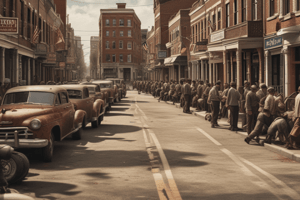Podcast
Questions and Answers
What was the impact of segregation after the civil war?
What was the impact of segregation after the civil war?
- The creole people and freed slaves no longer came in contact (correct)
- The creole people and freed slaves formed strong alliances
- The creole people and freed slaves were forced to live together
- Segregation had no impact on the interaction between creole people and freed slaves
What was the consequence of the civil war on the interaction between the creole people and freed slaves?
What was the consequence of the civil war on the interaction between the creole people and freed slaves?
- The civil war did not affect their interaction
- They were forced to live together after the civil war
- They interacted more frequently after the civil war
- They no longer interacted due to segregation (correct)
How did segregation affect the relationship between creole people and freed slaves post-civil war?
How did segregation affect the relationship between creole people and freed slaves post-civil war?
- They were no longer in contact due to segregation (correct)
- They formed strong alliances after segregation
- They were forced to coexist despite segregation
- Segregation had no impact on their relationship
What was the outcome of segregation for the interaction between creole people and freed slaves?
What was the outcome of segregation for the interaction between creole people and freed slaves?
After the civil war, the creole people and freed slaves no longer came in contact because of segregation?
After the civil war, the creole people and freed slaves no longer came in contact because of segregation?
The creole people and freed slaves continued to have regular interactions after the civil war?
The creole people and freed slaves continued to have regular interactions after the civil war?
The civil war had no impact on the relationship between creole people and freed slaves?
The civil war had no impact on the relationship between creole people and freed slaves?
Segregation was not a factor in the reduced contact between creole people and freed slaves after the civil war?
Segregation was not a factor in the reduced contact between creole people and freed slaves after the civil war?
Flashcards are hidden until you start studying
Study Notes
Impact of Segregation After the Civil War
- Segregation laws enforced racial discrimination, maintaining a social hierarchy favoring white populations over African Americans.
- Freed slaves faced limited access to education, employment, and public facilities, leading to economic and social marginalization.
- The establishment of Jim Crow laws institutionalized segregation, shaping the cultural and political landscape for decades.
Interaction Between Creole People and Freed Slaves
- Creole populations, often with mixed European and African ancestry, had varied interactions with freed slaves, influenced by local social dynamics.
- Post-war segregation reduced opportunities for meaningful interactions between Creole people and freed slaves, fostering divisions.
- While some Creole individuals allied with freed slaves for civil rights, broader societal segregation complicated these relationships.
Consequences of Segregation on Relationships
- The segregation era created significant barriers, resulting in an overall decline in social cohesion and collaboration.
- Many Creole individuals sought to distinguish themselves from freed slaves to maintain their own social status, exacerbating tensions.
- The outcome was a fragmented community, with diminished cultural exchange and unity between Creole people and freed slaves.
Continuation of Interactions Post-Civil War
- Although segregation limited contact, some communities maintained relationships through shared cultural practices and mutual interests.
- Certain areas saw collaborative efforts to combat discriminatory practices, highlighting resilience despite segregation.
Overall Conclusion
- Segregation had profound effects on the social landscape following the Civil War, altering existing relationships and restricting new interactions.
- The era fostered a complex landscape of division and limited unity between Creole and freed slave communities, deeply affecting their socio-cultural dynamics.
Studying That Suits You
Use AI to generate personalized quizzes and flashcards to suit your learning preferences.




